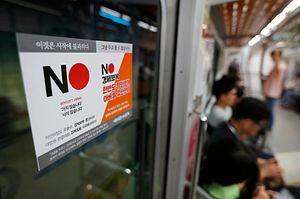Seoul, the South Korean capital, has been forced to take down more than 1,000 anti-Japan banners that it planned to hang across the city in a move to support the country’s ongoing boycott movement toward Japanese products.
The banners feature the word “NO,” with the red circle of the Japanese flag as the “O,” adding, “I won’t go [to Japan], I won’t buy [Japanese products].”
Within hours of starting to put up the banners, however, the city had to backtrack and apologize amid public criticism. Seo Yang-ho, the head of Jung-gu district, a central part of Seoul, said he “humbly accepted criticism that any boycott should remain on citizens’ voluntary basis.”
Anti-Japan sentiment is spreading rapidly in South Korea, but there are also growing voices urging the government and authorities to remain cool and seek ways to resolve the issue to avoid a long-term standoff. The public criticism of the Seoul government’s move to embrace the boycott movement is a good example.
People’s biggest concern is the impact on the economy. South Korea’s economy heavily depends on imports and exports, and many signs are emerging to indicate how dire the current situation is.
According to Statistics Korea, for example, South Korea’s exports to Japan amounted to $2.5 billion last month while imports were worth $4.15 billion. The figures were down 0.3 percent and 9.4 percent year-on-year, respectively. The trade balance also hit a deficit of $1.62 billion.
The semiconductor industries in the South are expected to suffer the most, thanks to Japan’s new export controls on necessary materials being shipped to South Korea. Prices of semiconductors already fell 37.7 percent in July year-on-year.
Of course, semiconductors are not the only problem. The prices of petrochemicals and petroleum products also fell 20.4 and 12.8 percent, respectively, during the same period.
Things are only going to become worse as tensions between Seoul and Tokyo simmer. Industry players in South Korea forecast that August’s economic trends could be the worst since March 2009, in the middle of the global financial crisis.
Major listed companies in South Korea already performed poorly in the first half of 2019, even before trade frictions with Japan ramped up. According to South Korea’s Financial Supervisory Service, 125 listed companies that announced their first-half earnings totaled 44.87 trillion South Korean won ($36.8 billion) in the first six months of 2019, a 37 percent plunge from the first half of last year. The poor performance is attributed to a 64 percent drop in operating profits of Samsung Electronics and SK Hynix, which together accounted for 58 percent of the 125 companies’ operating profits.
In addition, Moody’s Investors Service on June 30 downgraded its rating outlook for SK Hynix to “negative” from the previous “stable.” The adjustment is in line with increased borrowing and the Japanese government’s sanctions on exports of key semiconductor materials.
“If export regulations are further expanded, SK Hynix’s production could be disrupted,” Moody’s said. Moody’s Investors Service is the first global credit rating agency to cut its outlook on SK Hynix’s credit rating since Japan’s export sanctions.
Meanwhile, the Korea Economic Research Institute, affiliated with the Federation of Korean Industries, conducted a survey on the country’s top 600 companies by sales. Respondents forecasted that the Baltic Supramax Index would stand at 80.7 in August. The lower the BSI is below the benchmark of 100.0, the more negative the outlook is; 80.7 would be the lowest figure in over 10 years.
The business outlook for the manufacturing sector is not promising either. The BSI for manufacturing was predicted at 74.7, which is the lowest since March 2009. In particular, the outlook for the combined heavy and chemical industries stood at 71.9, the lowest since February 2009. By industry, the “car, trailer and other transportation equipment” sector had the most negative outlook, with a BSI of 52.3.
South Korea is not to be entirely blamed for the current situation with Japan, but it has become evident that some politicians are more interested in taking advantage of the situation to gather votes rather than resolving it.
An in-house think tank at the Democratic Party of Korea, the ruling party in South Korea, even released a report that hints the current standoff with Japan is good for the party’s chances in the upcoming election.
If the government and politicians cannot realize the gravity of the situation, it’s time for citizens to step up. More efforts to discourage reckless anti-Japan moves are needed, such as the one that stopped Seoul’s attempt to put up hateful banners.

































